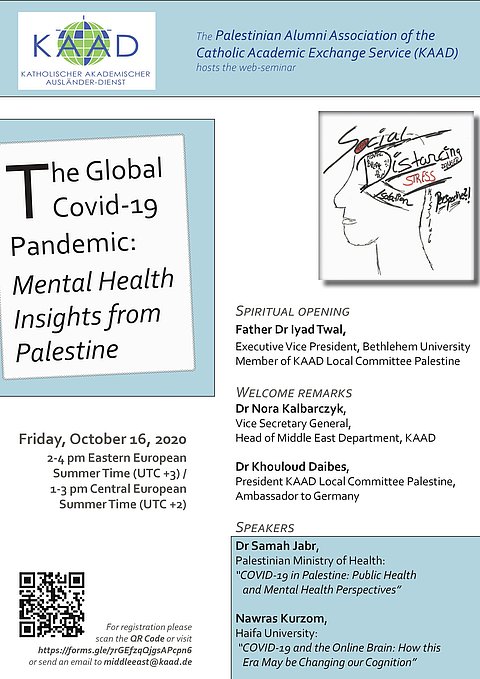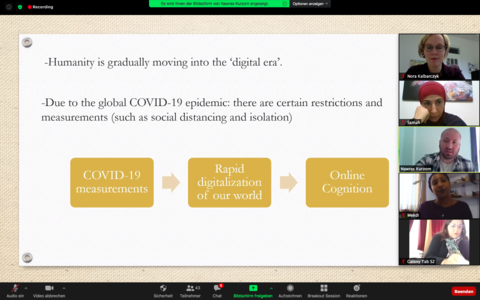One thing most of the KAAD alumni in Palestine have in common is their professional focus on medical occupations or on health issues in general. The Study on Development Policy Commitment of Students and Alumni by Hunger and Krannich (2018), examining the KAAD alumni networks in five selected countries, including Palestine, also came to this conclusion. In 2019, a KAAD Alumni Association in Palestine was founded in order to coordinate and further the alumni’s activities and to raise awareness for its networking. The association’s first event on mental health in Palestine should have taken place in Bethlem this October. However, due to the worldwide pandemic, the seminar had to be postponed. A much shorter, digital seminar on a different thematic focus took place instead.
Father Dr Iyad Twal, Member of KAAD Local Committee Palestine and Executive Vice President of Bethlehem University, opened the seminar spiritually. Welcome remarks by Dr Nora Kalbarczyk, Vice Secretary General of KAAD and Head of KAAD’s Middle East Department, and KAAD alumna Dr Khouloud Daibes, Palestinian Ambassador to Germany and President of the KAAD Partner Committee in Palestine, followed.
Dr Samah Jabr, Head of the Mental Health Department of the Palestine Ministry of Health and founding member of the “Palestine Global Mental Health Network”, was the first to speak on the seminar’s subject. In her lecture on “Covid-19 in Palestine: Public Health and Mental Health Perspectives“, she examined the current situation and development of the pandemic in Palestine and its impacts on health care in general and on mental health in particular. Dr Jabr highlighted on the one hand the extent to which specific developments can be explained by certain cultural phenomena (e.g. the increasing incidence of women due to cultural customs at weddings). On the other hand, it became also clear how the political context in both global and regional terms affects health care in the Palestinian territories. More and more facilities once used for mental health care, such as therapy centres, are now needed as test centres, places of treatment or quarantine in the fight against the pandemic. At the same time, however, the need for access to mental health care has increased during the pandemic, as the World Health Organisation has recently pointed out. Dr Jabr explained the strategies of the Ministry of Health to deal with the challenges for mental health issues caused by the pandemic.
The second lecture on the topic of “Covid-19 and the Online Brain: How this Era May be Changing our Cognition?” was held by KAAD alumnus Nawras Kurzom. The doctoral candidate in neurobiology of the University of Haifa dealt with the impacts of the pandemic on our cognition and perception. As a preliminary observation on the digital developments being already initiated earlier, but which were accelerated by the pandemic in an unprecedented way, it can be stated that both have positive and negative consequences with regard to individual and societal information gathering, information processing and sharing. At the same time, digital technologies can also be used in a profitable way in health care, including mental health care. The lively discussion following the two presentations showed how important it is to exchange views on the subject.
A total of 52 participants attended this events, among them partners and alumni from Palestine, Jordan and Lebanon as well as KAAD scholarship holders who study in Germany, Jordan or Lebanon and originally come from various countries in the Middle East and Africa participated in this event. Other Palestinian health experts also took part.
Although a digital event cannot replace personal encounters, it is nevertheless positive to highlight that the range of participants in this web seminar was broader and more heterogeneous than it would have been possible at a face-to-face event in this crisis-tested region. Thus, making greater use of such formats in the future was considered important by the participants.





